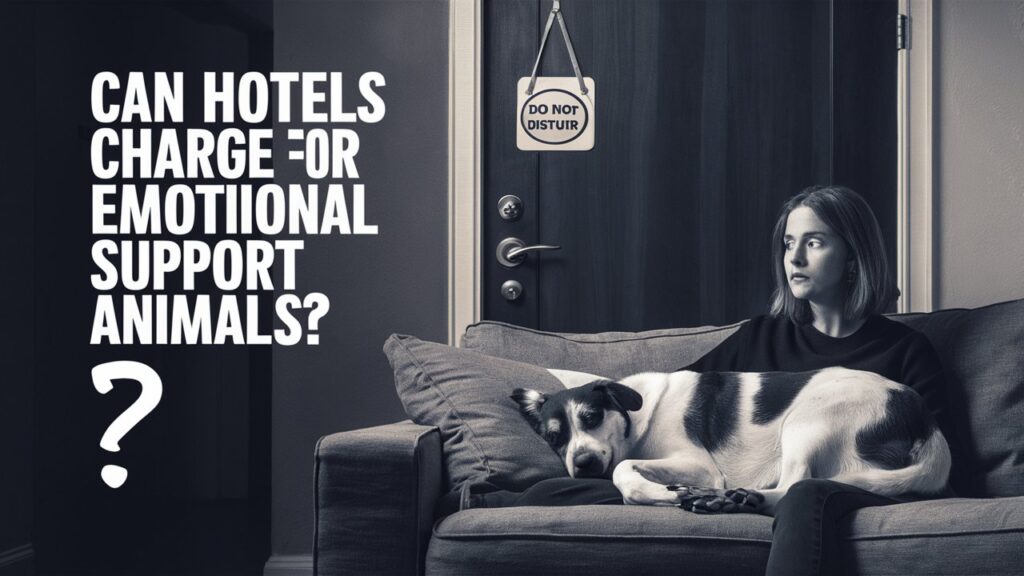Emotional support animals (ESAs) play a vital role in providing comfort and companionship to individuals facing emotional or psychological challenges. However, the issue of whether hotels can charge for accommodating these animals remains a topic of debate and confusion within the hospitality industry. To understand this issue better, let’s delve into the legal framework surrounding ESAs and the policies implemented by hotels.

Can Hotels Charge for Emotional Support Animals?
Hotels often have policies regarding pets on their premises, including whether they allow ESAs. However, the question arises: can hotels legally charge for accommodating these animals? The answer is not straightforward and depends on various factors.
Firstly, it’s essential to differentiate between service animals and emotional support animals. Service animals, such as guide dogs for the visually impaired, are trained to perform specific tasks for individuals with disabilities. Under the Americans with Disabilities Act (ADA), hotels are required to accommodate service animals without charging any additional fees.
On the other hand, emotional support animals provide comfort and support to individuals with emotional or psychological disorders. While ESAs do not have the same level of training as service animals, they are still recognized under certain laws, such as the Fair Housing Act (FHA) and the Air Carrier Access Act (ACAA). However, these laws do not specifically address whether hotels can charge fees for accommodating ESAs.
Legal Considerations for Hotels
When it comes to accommodating emotional support animals, hotels must navigate a complex legal landscape. Federal laws like the FHA and the ACAA protect the rights of individuals with disabilities, including the right to have an ESA in housing or when traveling by air. However, these laws do not explicitly extend to hotels.
In addition to federal laws, hotels must also consider state and local regulations, which may vary widely. Some states have enacted laws that specifically address the rights of individuals with ESAs in various settings, including hotels. Therefore, hotels must familiarize themselves with the laws applicable to their location to ensure compliance.
Factors Influencing Hotel Policies
Several factors influence hotel policies regarding emotional support animals. One key consideration is the impact on other guests. While some guests may appreciate the presence of ESAs, others may have allergies or fears of animals. Hotels must strike a balance between accommodating individuals with ESAs and ensuring the comfort and safety of all guests.
Another factor is accommodation limitations. Some hotels may have limited space or facilities that are not suitable for accommodating animals. In such cases, hotels may choose to restrict the presence of ESAs or charge additional fees to cover any associated costs.
Challenges Faced by Hotels
Hotels face several challenges when it comes to accommodating emotional support animals. One common challenge is fraudulent ESA claims. Some individuals may falsely claim that their pet is an ESA to bypass pet policies and avoid paying fees. Hotels must implement measures to verify the legitimacy of ESA claims while avoiding discrimination against individuals with legitimate needs.
Another challenge is ensuring the comfort and safety of all guests. While ESAs can provide valuable support to their owners, they can also pose risks, such as causing disturbances or damage to property. Hotels must establish clear guidelines for the behavior and care of ESAs to mitigate these risks effectively.

Best Practices for Hotels
To navigate the complexities of accommodating emotional support animals, hotels should adopt best practices. This includes establishing clear policies regarding ESAs, including any fees or restrictions that apply. Hotels should also request documentation from guests with ESAs to verify their need for accommodation.
By implementing these best practices, hotels can ensure that they comply with relevant laws and regulations while providing a comfortable and inclusive environment for all guests.
Conclusion
In conclusion, the issue of whether hotels can charge for emotional support animals is a complex and multifaceted one. While federal laws like the FHA and the ACAA protect the rights of individuals with disabilities, including the right to have an ESA, these laws do not specifically address the rights of hotels. Therefore, hotels must navigate a range of legal and practical considerations when developing policies regarding ESAs. By implementing best practices and considering the needs of all guests, hotels can strike a balance that ensures compliance with the law while maintaining a welcoming environment for everyone.
FAQs
- Can hotels legally refuse to accommodate emotional support animals?
- Are there any federal laws that specifically address the rights of hotels regarding emotional support animals?
- How can hotels verify the legitimacy of emotional support animal claims?
- What should I do if I encounter a guest with an emotional support animal in a hotel?
- Can hotels charge cleaning fees for rooms occupied by emotional support animals?









